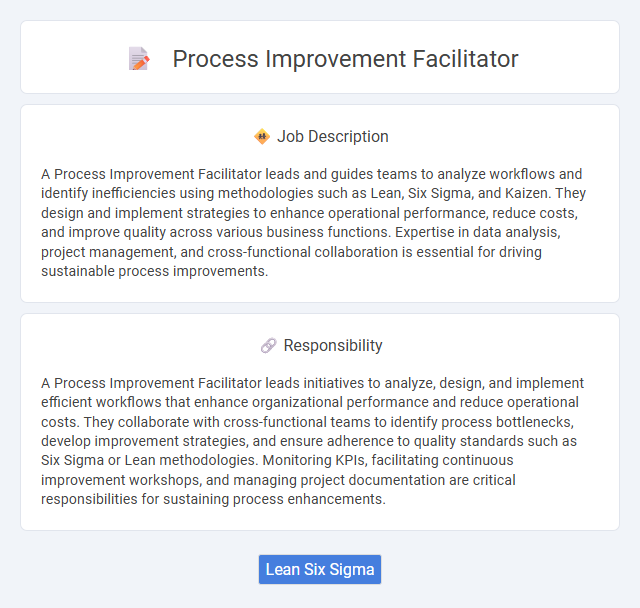
A Process Improvement Facilitator leads and guides teams to analyze workflows and identify inefficiencies using methodologies such as Lean, Six Sigma, and Kaizen. They design and implement strategies to enhance operational performance, reduce costs, and improve quality across various business functions. Expertise in data analysis, project management, and cross-functional collaboration is essential for driving sustainable process improvements.
Individuals with strong communication skills and a collaborative mindset are likely to excel as Process Improvement Facilitators. Those comfortable with analyzing workflows, identifying inefficiencies, and guiding teams through change processes may find this role particularly suitable. People who prefer dynamic environments and enjoy problem-solving in group settings probably align well with the demands of this job.
Qualification
A Process Improvement Facilitator should possess a strong background in Lean Six Sigma methodologies, with certifications such as Green Belt or Black Belt highly preferred. Expertise in data analysis, project management, and change management processes is essential to identify inefficiencies and implement effective solutions. Strong communication and leadership skills enable facilitation of cross-functional teams and promotion of continuous improvement across the organization.
Responsibility
A Process Improvement Facilitator leads initiatives to analyze, design, and implement efficient workflows that enhance organizational performance and reduce operational costs. They collaborate with cross-functional teams to identify process bottlenecks, develop improvement strategies, and ensure adherence to quality standards such as Six Sigma or Lean methodologies. Monitoring KPIs, facilitating continuous improvement workshops, and managing project documentation are critical responsibilities for sustaining process enhancements.
Benefit
Process Improvement Facilitators likely enhance operational efficiency by identifying bottlenecks and implementing streamlined workflows, leading to cost savings and faster project completion. Their skills in facilitating collaboration and communication may increase team productivity and innovation probability. Organizations might experience improved customer satisfaction as processes become more consistent and responsive to client needs.
Challenge
Process Improvement Facilitators likely face the challenge of navigating resistance to change within organizations, which can hinder the adoption of new methodologies and tools. They may encounter difficulties in aligning diverse teams and stakeholders around common goals and process standards. Successfully overcoming these obstacles often requires strong communication skills and the ability to foster collaboration in complex environments.
Career Advancement
Process Improvement Facilitators play a critical role in driving operational efficiency by identifying and implementing streamlined workflows across organizations. Mastery of Six Sigma, Lean methodologies, and change management enhances career advancement opportunities in sectors such as manufacturing, healthcare, and finance. Building expertise in data analytics and cross-functional team leadership significantly increases prospects for senior roles like Continuous Improvement Manager or Business Process Director.
Key Terms
Lean Six Sigma
A Process Improvement Facilitator leverages Lean Six Sigma methodologies to identify inefficiencies and implement data-driven solutions that enhance operational performance. By analyzing workflow processes and utilizing DMAIC (Define, Measure, Analyze, Improve, Control) techniques, they drive continuous improvements and reduce waste. Their expertise in value stream mapping and root cause analysis enables organizations to achieve measurable cost savings and improve quality metrics.
 kuljobs.com
kuljobs.com